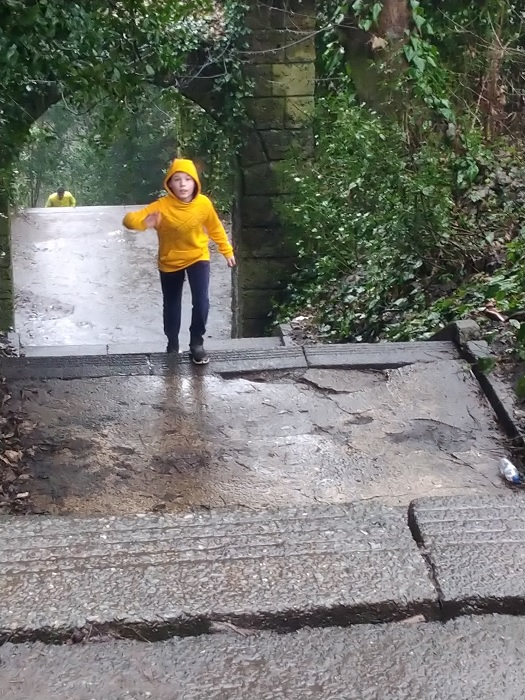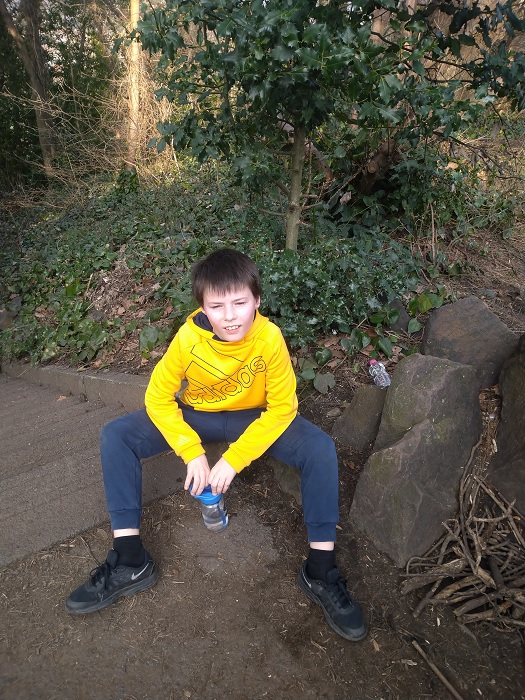Armley Park’s notorious 161 ‘Killer Steps’ have defeated many a fitness fanatic over the years. MICHELLE CORNS paid them a visit to meet an impressive schoolboy looking to work up a sweat for a good cause…
Schoolboy Sam Claxton is walking up and down Armley Park’s famous stairwell to raise money for Parkinson’s Disease.
It’s a beautiful afternoon in March and I’m standing at the top of the famous “Killer Steps” in Armley Park. I’m not about to go down them though – instead I’m here to watch 11 year old Sam Claxton, who is making numerous trips up and down the 166- step leafy stairwell, to raise money for vital research into Parkinson’s Disease at Sheffield University.
The steps, which are framed by a stone arch part way down, are a local beauty spot and a destination for keep-fit enthusiasts. The stairwell is wide enough to adhere to social distancing rules.
By the time I arrived (having had the mystery tour of Armley’s “Aviaries” trying to find the rear entrance to the park) Sam, wearing a mustard-coloured hoody and Nike trainers, has already completed six walks up and down the steps.

His usual amount is 20. I chat with Sam’s mum; Rachael about how her brave son, started this venture.
“It was during the first lockdown,” Rachael says. “Sam was bored, after being off school, so he wanted to something to do. His teacher at Castleton Primary School, was doing the steps to keep fit, and Sam was determined to beat him.
“He also wanted to something for charity, so he decided on Parkinson’s disease. Family and friends donated, and I set up a funding page. He has raised £520 so far and that is just through people we know and their friends.”
There is a personal reason for Sam’s decision. His nan has got Parkinson’s Disease – a degenerative brain disorder which causes uncontrollable shaking and tremors, stiffness and slow movement (according to: www.nhs.uk) so Sam has witnessed first-hand, the devastating effects of this cruel disease.
Although this disease is more common in people over 80, Sam’s nan is only 61 – proving that it can affect people who are much younger.

As I chat to Rachael, Sam has disappeared beyond the archway, he will go all the way to the bottom and back up, several times, before finally stopping at the top long enough to catch his breath and grab a drink of water, then he’s off again. He is a quiet, thoughtful boy and very humble about what he has achieved.
“He didn’t even tell anyone at school,” Rachael reveals. “It was other family members who told their schools about it, and they donated as well. I don’t think he even realises how big this is.”
Sam reappears, shortly, his face is glowing red and he is clearly out of breath, I ask him if sports is something he likes doing. He nods. “Yes, mainly dodgeball, I like doing that.”
We work out that Sam has now done 18 rounds of going up and down the steps. He soon disappears into the distance again, determined to get to 20. “His goal is 25,” Rachael says, “and we are going to publicise this as it will be when we are out of lockdown.”
The sun is dipping down behind the trees, by this time, its rays dappling the ground through the branches. As we wait for Sam’s final journey up and down the steps, a Yorkshire terrier bounds up the last few steps, and impatiently stares at its exhausted owners as they make the effort to get to the top.
I’m reminded that when I first arrived, Sam was also navigating the steps at a run. I’m quite envious as I can just about manage the four steps that lead up to my house! Sam finishes his 20th round and we applaud him. The family packs up and head for home. They will be back next weekend and Sam will make the same journey.
Since I made the journey to watch Sam, the donations have now gone up to £600. If you would like to contribute to Sam’s fundraising, please follow this link.

